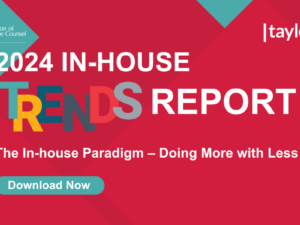How to build a diverse in-house legal team
There is a growing awareness of the value of recruiting diversity into organisations which is being driven by a combination of social, economic, and legal factors. This recognition is not just about fulfilling ethical responsibilities; it also ties directly to the business’s performance and reputation.
It’s a case where doing good also means doing well. Building a diverse in-house legal team aligns with equity and social justice principles. It ensures that individuals from all backgrounds have equal access to opportunities, fostering an inclusive work environment. The business case for diversity is equally strong, with growing evidence showing that companies with greater diversity in their ranks perform better.
Building a diverse in-house legal team involves a comprehensive approach encompassing recruitment, retention, development, and fostering an inclusive culture. Here are actionable strategies to achieve this goal:
1. Develop a clear diversity strategy
- Define diversity goals: Establish clear, measurable diversity objectives aligned with the organisation’s overall mission and values.
- Leadership commitment: Ensure top management, including the General Counsel, is visibly committed to diversity and inclusion.
2. Inclusive recruitment practices
- Diverse talent pools: Partner with diverse professional organisations, law schools, and bar associations to source a wide range of candidates.
- Inclusive job descriptions: Use inclusive language in job postings and clearly state the organisation’s commitment to diversity.
- Bias-free hiring process: Implement blind recruitment techniques, such as removing names and other identifying information from resumes, to mitigate unconscious bias.
- Diverse hiring panels: Assemble diverse interview panels to ensure varied perspectives during the selection process.
3. Create a supportive and inclusive culture
- Onboarding programs: Develop onboarding programs that emphasise the company’s commitment to diversity and inclusion.
- Employee resource groups (ERGs): Support ERGs that cater to different demographics within the legal team to foster a sense of belonging.
- Regular diversity training: Provide continuous training on diversity, equity, and inclusion (DEI) for all team members, including unconscious bias training and cultural competence workshops.
4. Mentorship and sponsorship programs
- Mentorship programs: Establish mentorship programs that connect diverse junior lawyers with experienced mentors who can guide their career development.
- Sponsorship programs: Develop sponsorship initiatives where senior leaders advocate for high-potential diverse employees, providing them with opportunities for visibility and advancement.
5. Professional development and career growth
- Tailored training programs: Offer professional development programs tailored to the needs of diverse employees, such as leadership training and specialized legal skills workshops.
- Clear career pathways: Ensure there are clear and transparent career progression paths, with regular feedback and support for diverse team members.
- Diversity in leadership: Actively work to promote diverse employees into leadership positions within the legal team.
6. Flexible work policies
- Work-life balance: Provide flexible working hours, remote work options, and generous parental leave policies to accommodate diverse needs.
- Inclusive benefits: Ensure that employee benefits are inclusive and support the diverse needs of all team members, such as healthcare benefits for same-sex partners and support for employees with disabilities.
7. Performance metrics and accountability
- Track diversity metrics: Regularly track and report diversity metrics within the legal team, such as the demographics of hires, promotions, and retention rates.
- Accountability for diversity goals: Hold leaders and managers accountable for meeting diversity goals, including incorporating these goals into performance reviews and compensation decisions.
8. External engagement and partnerships
- Community involvement: Engage with and support organisations that promote diversity in the legal profession, such as participating in diversity conferences and sponsoring scholarships for underrepresented law students.
- Pro bono initiatives: Encourage and support pro bono work that benefits diverse communities, demonstrating the organisation’s commitment to social justice and equality.
9. Regular feedback and continuous improvement
- Employee surveys: Conduct regular employee surveys to gather feedback on diversity and inclusion efforts and identify areas for improvement.
- Continuous improvement: Use the feedback to continuously refine and enhance diversity strategies and initiatives, ensuring they remain effective and relevant.
Diversity is a matter of fairness and a strategic advantage for in-house legal teams. Embracing diversity in hiring and fostering an inclusive workplace culture can drive innovation, improve representation, and ultimately lead to greater success for both legal professionals and the organisations they serve.
Building a diverse in-house legal team requires a sustained and multifaceted effort. By implementing these strategies, organisations can create a more inclusive and supportive environment that attracts and retains top diverse talent. This not only enhances the legal team’s performance but also aligns with broader organisational goals of diversity, equity, and inclusion.
As always, please reach out and get in touch anytime if you or your organisation may benefit from Taylor Root’s specialist legal search and recruitment services or if you are looking for your next career move.






